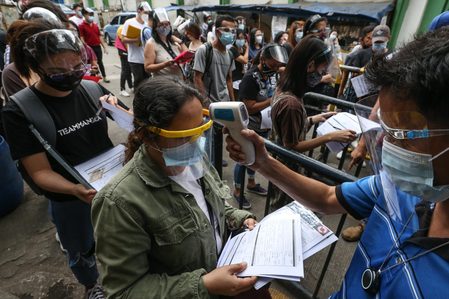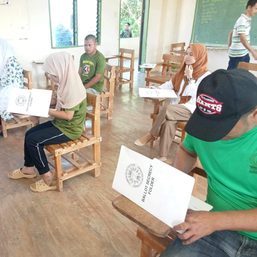SUMMARY
This is AI generated summarization, which may have errors. For context, always refer to the full article.
![[EXPLAINER] Extend voter registration? Here’s a compromise](https://www.rappler.com/tachyon/2021/09/election-registration-extension-compromise-21.jpg)
Weeks before the September 30, 2021, deadline for the registration of voters, there has been a call for an extension yet again. Certainly, this campaign is not being done for the first time; it’s a recurring cry every registration deadline.
The deadline for registration of voters was set by the Commission on Elections years ago. It reiterated this in its Calendar of Activities set in Comelec Resolution 10695, dated February 10, 2021. This deadline was set to coincide with the last scheduled Election Registration Board (ERB) hearing for the year, which under the law should be held on the third Monday of October or by October 18, 2021.
Contrary to the belief of many, one does not become a registered voter by merely filing an application to register with the Office of the Election Officer (EO). It is just the start of the long process. All applications for registration need to be checked and approved by the ERB of each city and municipality. The ERB is composed of the election officer as chairman, and the public school official most senior in rank and the local civil registrar as members.
The approval of these applications in the quarterly ERB hearings is the juridical act which makes an applicatn registered voter. The list of the newly-approved voters from all over the Philippines and their biometrics data are then physically transmitted to the Comelec main office in Intramuros, Manila, for AFIS screening. AFIS stands for Automated Fingerprint Identification System, the technology employed by the Comelec to compare each biometric information with its database containing data for around 60 million people.
The AFIS flags “hits” or identical biometrics, which could indicate “flying” or double registrations or those who registered twice under different identities. “Hits” are manually verified by Comelec examiners. Then these flagged registrations are returned to the local ERBs for deletion.
This complex registration process also needs to be completed in time for the other administrative preparations by the Comelec for the upcoming elections. For example, the final number of voters are necessary for:
- the proper allocation of official ballots, election returns, and other election forms and paraphernalia
- finalizing the Computerized Voters List
- the preparation, bidding, printing, and distribution of Voter’s Information Sheet
The printing of the 60 million ballots, for example, needs to start by December 2021, which means the final number of voters needs to be fixed by that time.
Now, here is the problem. Republic Act 8189 mandates a “system of continuing registration of voters.” Section 8 thereof sets the voter registration deadline to 120 days before a regular election. This means that for the May 9, 2022, elections, the deadline under the law should really be January 9, 2022.
The problem with this is that RA 8189 was passed in 1996 or around 15 years before the era of automated elections. There was no AFIS then, and elections were done manually, and thus required only at least three months of preparation as against the two years needed for an automated election now.
In 2009, youth groups led by the Kabataan Party-List representative Raymond Palatino raised this conflict before the Supreme Court in the case of Kabataan Party-List vs. Comelec (G.R. No. 189868, December 15, 2009). The SC ruled:
“[T]he clear text of the law…decrees that voters be allowed to register daily during regular offices hours, except during the period starting 120 days before a regular election and 90 days before a special election.”
The dispositive portion of the decision succinctly provided:
“WHEREFORE, the petition is GRANTED. COMELEC Resolution No. 8585 is declared null and void insofar as it set the deadline of voter registration for the May 10, 2010 elections on October 31, 2009. The COMELEC is directed to proceed with dispatch in reopening the registration of voters and holding the same until January 9, 2010. This Decision is IMMEDIATELY EXECUTORY.”
With the registration deadline looming, Comelec once again is in a dilemma, being asked to comply with an antiquated law and at the same time being expected to adequately prepare for the automated elections. While the law is admittedly clear that voters have the right to register up to January 9, 2022, the reality is this can terribly hamper Comelec’s preparation, given the printing schedule this December.
Personally, I believe that the SC was wrong in the Palatino decision, not because it read the law wrong, but because of its restrictive and isolated reading of Section 8 of Republic Act 8189. The High Court should have taken cognizance that after RA 8189 was passed in 1996, RA 8436 (December 22, 1997) and RA 9369 (January 23, 2007) have since been passed, mandating a shift to an automated election system.
Under a pro-active Congress, the voter registration law should have been updated to coincide with the new election system. But since we live in the Philippines, we are stuck with laws detached from realities on the ground, and Comelec is left to “harmonize” the conflict.
This has not been tested and is, of course, open to a constitutional challenge, but the only compromise I see is for Comelec to re-open and extend the registration to January 9, 2022, but set a cut-off that only those who registered by September 30, 2021, and whose corresponding ballots have been printed by December 2021 can vote in the May 9, 2022, elections. Those who register after by September 30, 2021, will have to wait for 2025 to exercise their right to vote.
This compromise both satisfy Section 8 of Republic Act 8189 and the Comelec’s preparatory requirements for the 2022 elections. This also does not reward our terrible culture of belatedness because, whether we admit it or not, Comelec offices have been open for registration since after the 2019 elections, and there has been plenty of opportunity to register even with the intermittent pandemic closures. – Rappler.com
Emil Marañon III is an election lawyer specializing in automated election litigation and consulting. He is one of the election lawyers consulted by the camp of Vice President Leni Robredo. Marañon served in Comelec as chief of staff of the late Chairman Sixto Brillantes Jr. He graduated from the SOAS, University of London, where he studied Human Rights, Conflict, and Justice as a Chevening scholar. He is a partner at Trojillo Ansaldo and Marañon (TAM) Law Offices.
Add a comment
How does this make you feel?

![[WATCH] In The Public Square with John Nery: Preloaded elections?](https://www.rappler.com/tachyon/2023/04/In-the-Public-Square-LS-SQ.jpg?resize=257%2C257&crop=414px%2C0px%2C1080px%2C1080px)
![[Newspoint] 19 million reasons](https://www.rappler.com/tachyon/2022/12/Newspoint-19-million-reasons-December-31-2022.jpg?resize=257%2C257&crop=181px%2C0px%2C900px%2C900px)

![[OPINION] The long revolution: Voices from the ground](https://www.rappler.com/tachyon/2022/06/Long-revolution-June-30-2022.jpg?resize=257%2C257&crop=239px%2C0px%2C720px%2C720px)
![[OPINION] I was called a ‘terrorist supporter’ while observing the Philippine elections](https://www.rappler.com/tachyon/2022/06/RT-poster-blurred.jpeg?resize=257%2C257&crop_strategy=attention)





There are no comments yet. Add your comment to start the conversation.